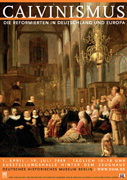


Exhibiton
| I. Calvin and Geneva
| II. The Confession
| III. The Reformed Alliances
IV. Discipline and Republic
| V. Iconoclasm and New Pictorial Worlds
VI. The Word of God
| VII. The New Order of Life
| VIII. Traditions
Calvinism has had far-reaching effects. Reformed churches can be found throughout the world nowadays. Reformed theology has had a marked influence on Christianity in the 19th and 20th centuries. Furthermore, certain images have become fixed in our minds. Interpretations of history have always had to do with present-day problems.
Calvinism stands for the birth of the modern age. It paved the way for modern capitalism by giving methodical work and inner-worldly success a new meaning – at least according to the interpretation of the sociologist Max Weber. This is quite apparent in the city of Geneva, where their clocks and watches are as famous as their banks. Geneva is a city of international character, and this, too, is linked to the overreaching networks of Calvinism.
But Calvinism also stands for a rigid morality and strong group pressure. This is reflected in the photographic portraits of the later Reformers, who apparently draw a direct line of tradition from the 16th century to the present day. For many contemporaries, the concept of Calvinism is still connected with the memory of a strict upbringing. However, transparency as a basic tenet of Calvinist congregations also reminds us that, on a much larger scale, democracy not only grants the individual certain liberties, but also places high demands on him.
